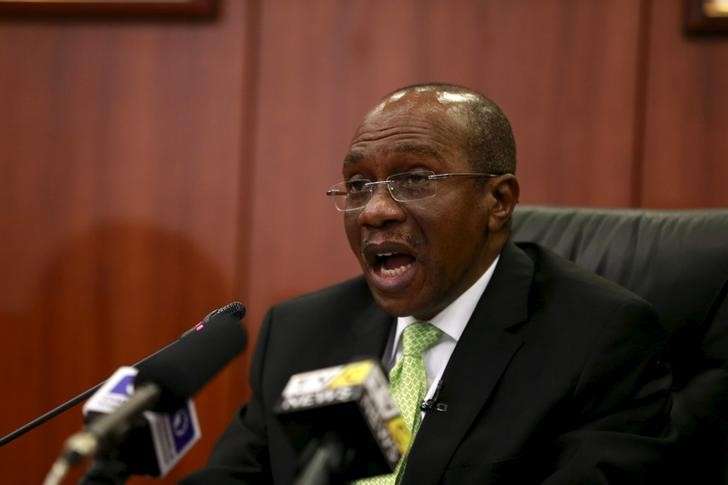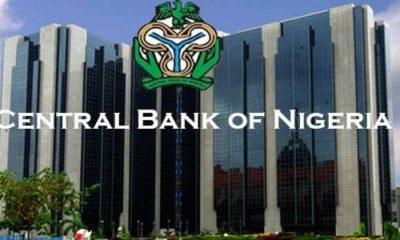Finance
Emefiele and the economics of the Naira free fall

By Udo NTUDO
LAGOS-EVER since the naira entered into a tail-spin, performing woefully against other currencies, there has been an outpouring of concern by disillusioned citizens. Perhaps because of the high prevalence of poison in contemporary politics in the country, all manner of suggestions have been made.
One of such suggestions that have not only heightened exasperation among the informed but also exposed the degree of ignorance of their proponents is the tendency to blame the Governor of the Central Bank of Nigeria (CBN), Mr Godwin Emefiele for the fate of the naira. This argument is not only hare-brained but reflective of the tear-jerking ignorance that inspires its protagonists.
For starters, elementary economics tells us that the value of any currency is determined by a predictable composite, one of the most critical of which is the aggregate contribution of economic production to the gross domestic product of the economy. For a mono-product economy like Nigeria’s, which depends almost solely on oil, this scenario, in itself, is well-defined for economic disaster which is exactly what is playing out.
Rather than waste energy in dramatizing ignorance of basic economic principles, protagonists of trending politics, that is dripping with poison and vendetta, should concern themselves with questions like, why has it remained convenient for the FG to continue to grant import waivers for items as basic and ridiculous as tooth picks and bottled water among others that profile the vanity of a lazy middle class? Rather than review the quantum of rudderless economic policies, which precipitated the exodus of manufacturing companies from Nigeria to neighbouring countries, the apostles of the trending politics of poison and vendetta seem determined to tackle the same person who has been battling to manage the consequences of the riotous politicking by government.
Like, former Akwa Ibom State governor and the Senate Minority Leader, Chief Godswill Akpabio, who is yet to be credited with the genius of designing the socio-economic renaissance of that state with his revolutionary free and compulsory education programme because of the trending politics of vendetta, Emefiele has been suggested for needless sacrifice , perhaps to whet the enormous capacity for mischief by these hidden persuaders who appear bent on derailing the change proposition by Presdient Muhammadu Buhari. Suddenly, it is so politically convenient to ignore the tested economic fact that any country, which does not produce any thing, has no reason to be alarmed if its currency inevitably slides into danger as the naira is currently doing.
Besides operating an economy which is insatiable in terms of capacity to absorb every junk brought from abroad, a sufficient reason to kill the naira, the ill-advised resolve by the principal actors in this government to disparage the immediate political dispensation has, ironically, the combined with other factors to intensify international dismay with and suspicion for the country’s economy.
Did the managers of the rowdy orchestra of anti-corruption expect international confidence in the country’s economy after key actors, including the president, have repeatedly rendered uncomplimentary testimonies against the economy? Even if the naira had maintained a semblance of stability, how could we have expected a non-producing economy to behave other than reflect its true economic worth? For God’s sake, Emefiele should not be made a scapegoat in a political conspiracy that he had no hand in.
Every nation’s currency is a reflection of certain basic economic composites, especially sectoral contribution to the Gross Domestic Product (GDP). It is like a system where a unit can not run faster than the whole. Because the rest of the country was in a hurry to rape the ‘conquered’ territory of Biafra and outlying regions, every one abandoned what they knew best how to do to bring food to the table and now that the oil bubble has burst, the hilarity in this foolishness has suddenly become dramatic, with most state governments unable to pay workers salaries.
Only diversification of the economy can save Nigeria. Those clamouring for the removal of Emefiele as CBN Governor because of the free-fall of the Nigeria are victims of spectacular ignorance. The dynamics to achieve a stable and strong currency, unfortunately, can not be fabricated even in the laboratory of poisoned politics. The naira is a reflection of our true worth as a nation.
*Ntudo is a Lagos based public affairs analyst.
Business
Nigeria pays US$4.9 billion on petrol subsidy in 2024- NNPCL
It was however noted by Biztellers.com.ng, that although subsidy is back in effect, the main reason for that is the increasingly weak state of the Naira and the country’s extreme dependence on products importation. Also unlike the previous subsidy era, where several oil marketers were getting free subsidy refunds for unverified product importation, this subsidy era is witnessing only one importer, the NNPCL, which in effect is the sole receiver of government subsidies.
Yemie ADEOYE
INSPITE of the official position of the Nigerian government that the controversial petrol subsidy is gone for good as announced by the President on assumption of office, the state owned Nigerian National Petroleum Corporation Limited, NNPCL has disclosed that petrol subsidy is still fully operational in Nigeria, although, under a different identity.
Umar Ajiya, Chief Financial Officer at the NNPCL, disclosed that it cost the company a staggering N7.8 trillion (US$4.9) to cover this price gap in the first seven months of 2024.
Rather than simply referring to these claims as subsidies, he stated that the company is merely managing the price difference in petrol imports on behalf of the federation, stressing that this should not be misconstrued as a return to subsidy payments.
![]() This revelation has reignited discussions on whether the NNPC is indirectly offering subsidies, a concept typically defined as selling a product below its cost price.
This revelation has reignited discussions on whether the NNPC is indirectly offering subsidies, a concept typically defined as selling a product below its cost price.
Documents reviewed by Biztellers.com.ng showed that the term “subsidy” was used extensively in official correspondence between the NNPCL and the presidency, particularly in reference to the “shortfall.”
Recall that President Bola Tinubu reportedly approved NNPC’s request to utilize the 2023 final dividends due to the federation to offset these costs.
However, during a media briefing on Monday about the company’s 2023 audited financial statements, Ajiya refuted claims that the NNPC is involved in any subsidy scheme.
Ajiya further disclosed that the Nigerian government owes the NNPC N7.8 trillion ($4.9 billion) in subsidy-related debts for the period from January to July 2024.
In furtherance of his clarification to the News Agency of Nigeria (NAN), Ajiya insisted that no subsidy payments have been made to any marketer in the last nine years, citing the NNPC’s role as the sole importer of petrol under supply contracts.
He said, “In the last eight to nine years, NNPC Ltd. has not paid anyone a dime as a subsidy; no kobo has been disbursed by NNPC Ltd. in the name of subsidy. No marketer has received any payment from us for subsidy.”
“What has been happening is that we have been importing PMS, which has been landing at a specific cost price, and the government tells us to sell it at half price. So the difference between the landing price and that half price is a shortfall.
“And the deal is between the Federation and NNPC Ltd., to reconcile, sometimes they give us money, so there is no money exchanging hands with any marketer in the name of subsidy.”
Ajiya remained silent on how much of the $4.9 billion could have been remitted to the federation account if the NNPC had not been covering the “shortfall.”
It was however noted by Biztellers.com.ng, that although subsidy is back in effect, the main reason for that is the increasingly weak state of the Naira and the country’s extreme dependence on products importation. Also unlike the previous subsidy era, where several oil marketers were getting free subsidy refunds for unverified product importation, this subsidy era is witnessing only one importer, the NNPCL, which in effect is the sole receiver of government subsidies.
Banking
CBN Denies Currency Devaluation

The Central Bank of Nigeria (CBN) has refuted claims of devaluing the.
Earlier reports suggested that the CBN had devalued the Naira, lowering its exchange rate from N631 to the dollar, compared to the previous day’s rate of N461.60 at the Importers and Exporters (I&E) window.
However, the Central Bank of Nigeria (CBN) released a statement on Thursday through its Acting Head of Corporate Communications, Dr. Isa Abdulmumin, categorizing the report as false information.
In the statement titled ‘CBN Has Not Devalued The Naira’, he said the attention of the apex bank was drawn to the news report by an Abuja based newspaper edition of June 1, 2023, titled “CB Devalues Naira To 630/51”.
However, the CBN stated categorically that the news report was replete with outright FALSEHOODS and destabilizing innuendos, ‘reflecting potentially willful ignorance of the said medium as to the workings of the Nigerian Foreign Exchange Market.’
“For the avoidance of doubt, the exchange rate at the Investors’ & Exporters (I&E) window traded this morning (June 1, 2023) at N465/USS1 and has been stable around this rate for a while.
“The public is hereby advised to ignore the news report by Daily Trust in its entirety, as it is speculative and calculated at causing panic in the market,” the CBN spokesman added.
He, therefore, advised media practitioners to verify their facts from the Central Bank of Nigeria before publishing in order not to misinform the public.
Banking
BREAKING: CBN Increases Interest Rate By 0.5%

The interest rate in Nigeria has been raised to 18.5 percent, up by 0.5 percent, from 18 percent where it was pegged in March 2023.
The Central Banks of Nigeria’s (CBN) Monetary Policy Committee (MPC) resolved to this effect at its third meeting of 2023 in Abuja, on Wednesday.
Governor, CBN, Godwin Emefiele, made the disclosure in the communiqué of the MPC’s meeting, thereafter.
While engaging the media at the end of the two-day meeting, Emefiele, said the committee voted to keep the asymmetric corridor at +100 and -700 basis points around the MPR.
In the view of the MPC, rising inflation rate is traceable to the high energy cost and challenges around the supply chain, among others, which lie outside the corridors of the CBN.
Emefiele said, “The current trend in price development would continue to be monitored by the bank with greater collaboration with fiscal authority to address the drivers of inflation.”
Biztellers reports that the CBN had effected six consecutive interest rate increases, which has seen the rate move from 11.5 percent in March 2022 to 18.5 percent in May 2023.



















